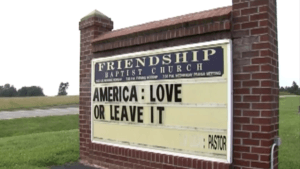An independent fundamentalist Baptist church in Virginia entered a national debate over President Donald Trump’s tweet urging four Democratic congresswomen to go back to their home countries with an outdoor sign saying “America: Love or Leave It.”
National media outlets including Time Magazine, The Hill and the New York Times all ran headlines about the marquee at Friendship Baptist Church in Appomattox, Virginia. The Associated Press coverage of the sign made it all the way to Japan.
 Pastor E. W. Lucas told Lynchburg, Virginia, ABC affiliate WSET he has been putting up signs since he started the church in 1979, usually with sermon titles.
Pastor E. W. Lucas told Lynchburg, Virginia, ABC affiliate WSET he has been putting up signs since he started the church in 1979, usually with sermon titles.
“I thought I was going to make some remarks regarding the situation in Washington,” Lucas said. “It just came to me. I just said, ‘America, I love it. If you don’t love it, leave it.'”
Independent Fundamental Baptist churches in the United States proliferated in the modernist/fundamentalist controversy in the 1920s. While the rules are not hard and fast, they typically hold to traditional standards of church music — singing hymns and rejecting contemporary Christian music and the use of electric guitars and drums — preach only from the King James Version of the Bible and are led by male pastors and all-male deacon boards. They support their missionaries directly and are wary of religious judicatory bodies beyond the local church.
It is not uncommon for IFB pastors to promote their countercultural message in public with language intended to offend.
A coalition of churches calling themselves the New Independent Fundamentalist Baptist Movement last month held a conference in Orlando, Florida, coinciding with the third anniversary of the Pulse nightclub shooting with the title “Make America Straight Again.”
Pastor Steven Anderson of Stedfast Baptist Church in Tempe, Arizona, made headlines in 2014 when he recommended the mass extermination of LGBT people as a cure for AIDS.
“Preachers, by and large, today, are afraid they’re gonna hurt somebody’s feelings, and when I get in the pulpit, I’m afraid I won’t hurt somebody’s feelings.”
The Good News Baptist Church in Spring Hope, North Carolina, singled out Muslims in 2007 with a sign on one side claiming the message of Islam is “submit, convert or die” and the other side reading, “When was the last time you heard of a Jew or Christian with a bomb strapped to their body.”
The most famous, or infamous, example is Westboro Baptist Church in Topeka, Kansas, a self-described Old School Baptist Church put on the map when they protested the 1998 funeral of a gay college student named Matthew Shepard with signs reading “Matt in Hell” and “God hates fags.”
The love-it-or-leave-it expression is especially poignant in Appomattox, where Gen. Robert E. Lee’s surrender to Ulysses S. Grant signaled the end of the Civil War. The sentiment has a long nativist history in the U.S. including 19th century resentment of European Catholic immigrants arriving on the East Coast and Chinese immigrants joining the California Gold Rush of 1849. A billboard in North Carolina circa the 1970s read: “This is Klan country. Love it or leave it.”
Pastor Lucas told Lynchburg’s ABC 13 News that after receiving favorable comments, he decided to leave the sign up for a while. He said his pastoral duties outweigh potential backlash.
“Preachers, by and large, today, are afraid they’re gonna hurt somebody’s feelings,” he said. “When I get in the pulpit, I’m afraid I won’t hurt somebody’s feelings.”
The Friendship Baptist Church Facebook page was down as of Friday morning, and a Google search of “Friendship Baptist Church Appomattox” produced about 86,600 results.
